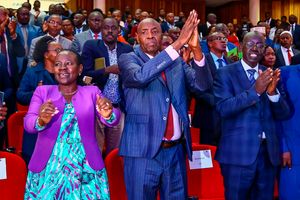
High school students go home for the mid-term break. Education takes a huge chunk of government budget.
Kenya's huge Sh676.92 billion education budget is set for a shake-up following an impending International Monetary Fund (IMF)-backed audit aimed at curbing graft and wastage of public funds.
The audit will be part of a governance and diagnostic programme agreement between Kenya and the IMF in October 2024, which comes in the wake of mounting social pressure and protests over high taxation and wastage of public funds.
The IMF mission initiative monitors governance and transparency levels to curb graft and the abuse of public office for private gain. It involves in-depth, country-specific assessments of corruption and governance vulnerabilities, with a view to making recommendations on how countries can combat corruption and revenue leakages.
The National Treasury now says it expects to receive the final report of the governance and anti-corruption diagnostic from the IMF before the end of October, with the education sector one of the main targets for planned expenditure rationalisation.
“The Government of Kenya requested for a governance diagnostic from the IMF and the mission has been to Kenya and promised us that by October they will have the final report. The government of Kenya will then decide whether to publish this report and from where I sit, I don’t see why that should not be published,” said National Treasury Cabinet Secretary John Mbadi.
“We feel that education, which is taking the largest chunk of our budget needs to be looked into in terms of strengthening the systems. If you look at capitation, are we paying for students who are in school or we are paying for students who are just existing on paper? We are spending about Sh400.0 billion on paying teachers and these are all things that we need to look into.”
The Teachers' Service Commission accounts for the lion's share of the education sector's budget at Sh366.5 billion, of which 97 percent (Sh365.6 billion) is allocated to teachers' salaries, having increased by 5.2 percent between Supplementary Budgets I and II 2024/25.
The State Department for Basic Education accounts for the second largest share of the sector's budget at Sh138.8 billion, followed by the State Department for Higher Education and Research at Sh135.9 billion. The State Department for Technical Vocational Education and Training receives the least at Sh35.2 billion.
“These are suggestions that we have shared with the IMF because we are the ones who understand our systems best. Once this report is out, I do not see any reason why it will not be made public” Mr Mbadi said.
On April 17, 2025, Mr Mbadi told the National Assembly that education sector spending and the compensation of teachers and lecturers was the key reason behind the 6.7 percent increase in the country’s monthly public sector wage bill between December 2024 and January 2025.
“Our public sector wage bill has moved from Sh75 billion per month in December 2024 to Sh80 billion in January 2025 because we onboarded JSS (junior secondary school) teachers at enhanced salaries. We also had to adjust the salaries of our disciplined forces and we also had to adjust the salaries of lecturers by Sh4.3 billion and all this has pushed our public sector wage bill up,” Mr Mbadi told MPs on April 17.
The planned audit of education spending comes at a time when Kenya is struggling to reach a new agreement with the IMF, having ended its last programme early due to challenges in implementing some of the reform measures agreed with the IMF.
The early termination of the just-ended IMF programme meant that Kenya missed out on Sh109.9 billion worth of funding in the current financial year.









